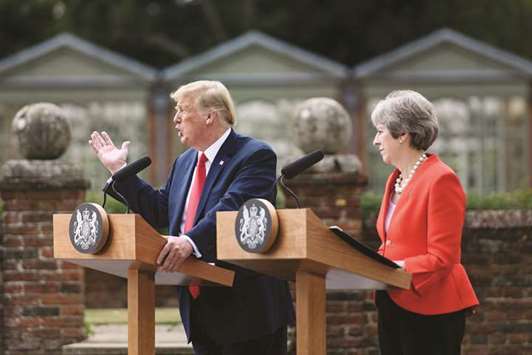The combination was always going to be high-risk. Donald Trump, straight-talking disruptor-in-chief, grants an interview to the Sun, a newspaper in so many ways the US president’s natural forum. The interviewer’s 10-minute slot stretches to 28; the interviewee is clearly enjoying himself, and the resulting headlines – “May has wrecked Brexit”, “US trade deal is off” – appear slap-bang in the middle of the prime minister’s grand opening effort to convince him of the contrary.
The insults continued for page after lurid page, including dismissive comments about the prime minister’s new plan for Brexit (“I think the deal is not what the people voted on”); about Theresa May’s conduct of the negotiations (“I actually told Theresa May how to do it, but she didn’t listen to me … she wanted to go a different route”); and – dear, oh dear – about the “very talented guy”, Boris Johnson, who “would be “a great prime minister”, whom he was “surprised and saddened” to see leaving government.
The consternation in the prime minister’s entourage – whose central purpose in life, ever since the date of the Trump visit was announced, would have been to ensure that such things did not happen – can well be imagined. From holding the PM’s hand on her first visit to his White House to his no-holds-barred interview with the Sun, Trump’s contribution to the “special relationship” will certainly go down as unusual. It’s a pity we will have to wait 30 years, or perhaps even more, for the archives to reveal what Downing Street and the masters of UK diplomacy really thought, as the strawberries and clotted-cream ice cream were served in the splendour of Blenheim Palace.
But should anyone really have been taken aback?
After 18 months of his presidency, was more evidence really needed that Trump just does not do diplomacy, or protocol, or even common or garden civility? He just lets rip as he chooses. Some leaders have used this to their advantage. They include some of those least practised in the conventional diplomatic arts (North Korea’s Kim Jong-un) and those young and confident enough to combine meticulous protocol with a spot of arm-wrestling (Emmanuel Macron).
The trouble with the UK, it might be said, is that it is just too good at old-style diplomacy, too confident in its expectations that others, at least those from law-governed democratic countries, are familiar with the same rules and will abide by them. So might it be time to ditch all those pesky niceties that – some would argue – can sometimes be all that lie between settling differences around the table or on the battlefield?
It is difficult to envisage the UK – for one – throwing caution to the wind and starting to play diplomatic hardball from now on. Indeed, it is not even clear that this is what Trump thought he was doing in his Sun interview. He may well have thought that he was telling it as he saw it, Trump being Trump, rather than lobbing a succession of calculated insults in the direction of his hosts. The conundrum facing No 10 now is whether and how to respond. The sunnily cautious comments of the foreign office minister, Alan Duncan, on the BBC this morning, suggested that the official decision was to grin and bear it, rather than engage in anything more dramatic.
But Trump’s language, along with his general mode of operation, does pose questions about the continued usefulness – or not – of diplomatic convention in the age of instant communications. Is there a virtue in telling things as they are, rather than wrapping them up to minimise offence? How much sense is there in trying to defend political leaders from themselves? How well has Albion’s perfidy (as others see it) really served us in our foreign relations? Could more honesty in diplomacy actually be a good thing?
Then there is the actual effect, as opposed to any intention or purpose, in what Trump had to say. It is not, after all, the first time in recent years that a visiting US president has breached protocol to interfere in Britain’s “internal affairs”. Barack Obama warned – apparently at the behest of the then prime minister, David Cameron – that Brexit could take us to the “back of the queue” for a trade agreement with the US. His advice did not go down well – even with a public pretty well-disposed towards that president. Indeed, it may have helped tipped the balance towards Brexit.
So it may be worth calming the indignation and carrying on. In the end, it may turn out that Donald Trump has done Theresa May a favour. - Guardian News & Media
* Mary Dejevsky is a writer and broadcaster. She is a former foreign correspondent in Moscow, Paris and Washington, and a special correspondent in China and many parts of Europe.

US President Donald Trump and Britain’s Prime Minister Theresa May hold a joint press conference following their meeting at Chequers, the prime minister’s country residence, near Ellesborough, northwest of London, yesterday, on the second day of Trump’s UK visit.
